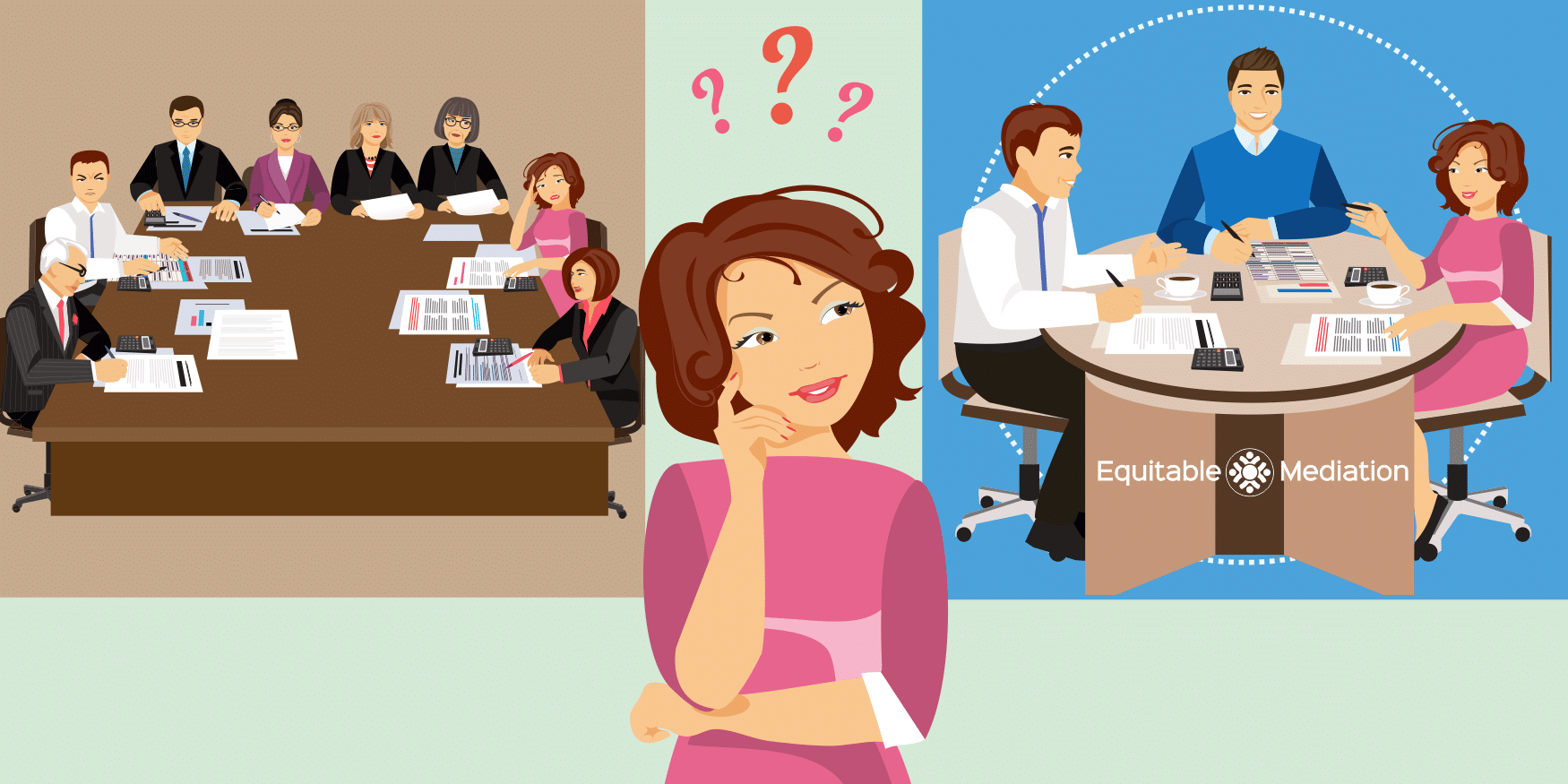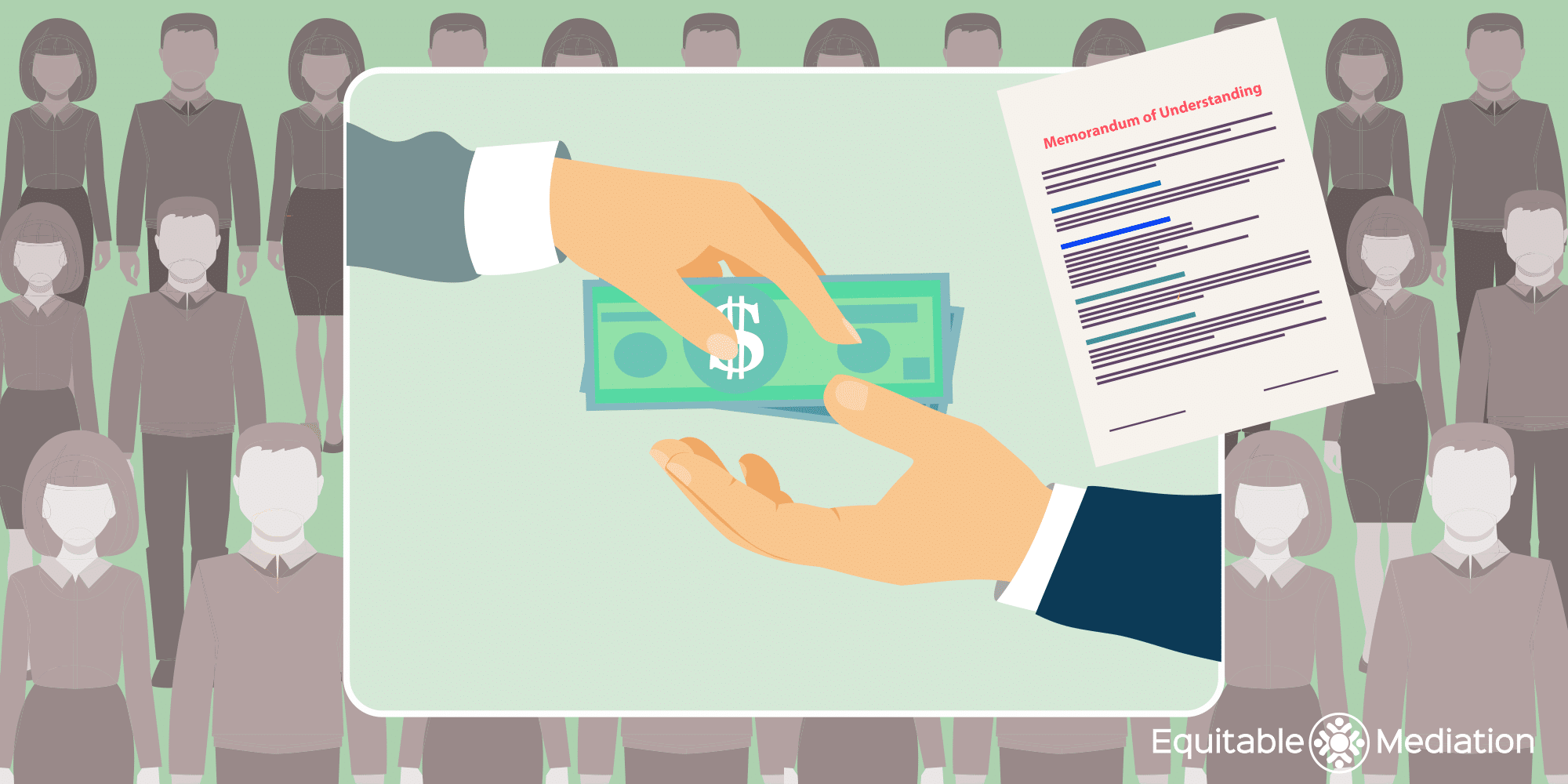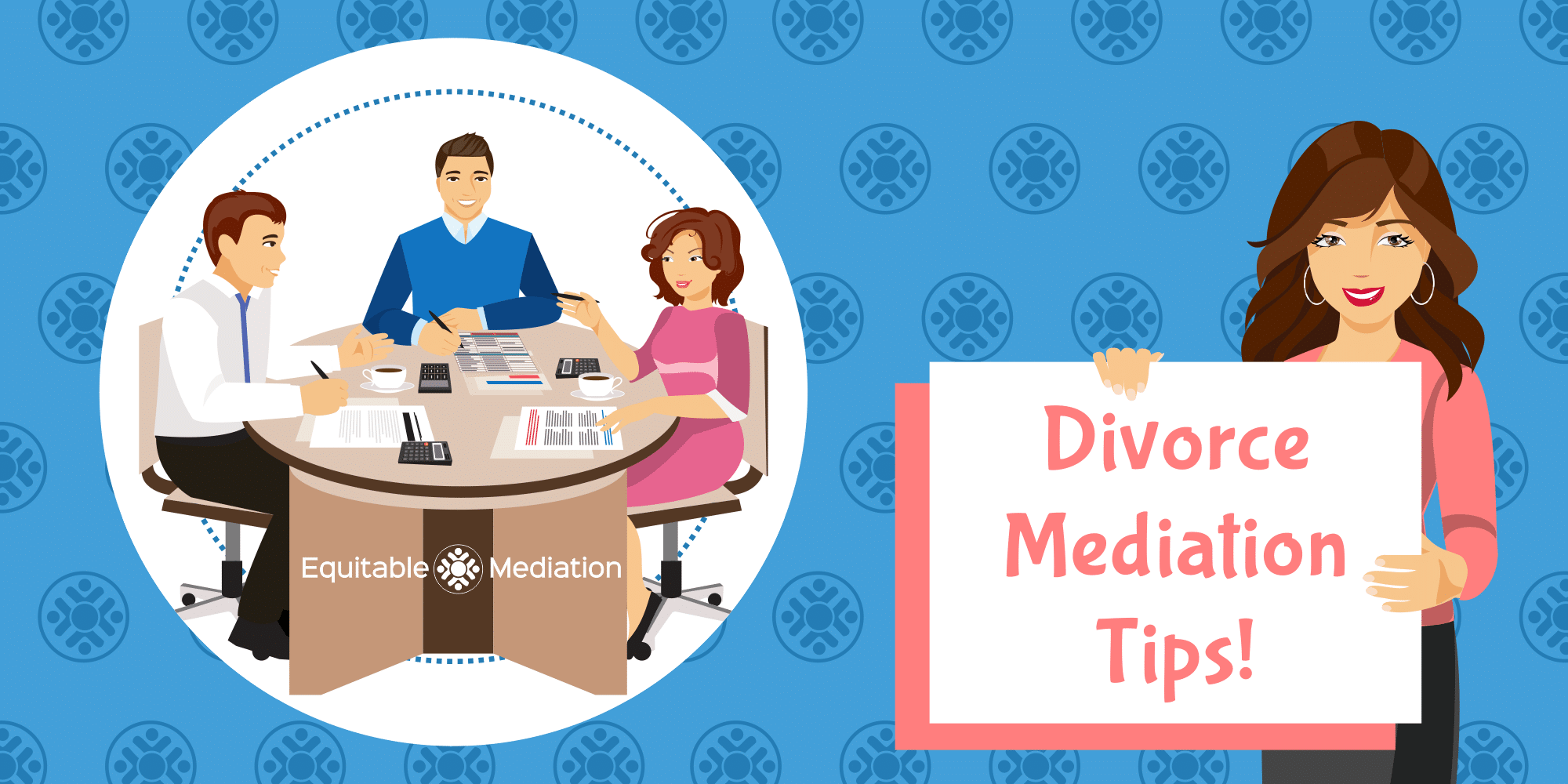Going through a major life event such as divorce is a significant and stressful experience. It’s not only emotionally devastating, but the divorce process itself can be long, drawn-out and destructive to everyone involved, including your children.
In divorce, no one wins. But how you move through – and eventually beyond a divorce is your choice. So wouldn’t you want to choose the divorce option that’s peaceful, cost-effective and best for you and your kids? Of course you would!
No other divorce option comes close to offering the benefits of mediation.
In this post, you’ll learn about the biggest advantages of mediation including:
- Mediation enables a divorcing couple to resolve their divorce issues out of court.
- Divorce mediation is the most child-focused of all divorce options.
- Mediation can help you get through your divorce in less time, with less stress, less conflict, and at a lower cost than a lawyer-driven divorce litigation or a collaborative divorce.
- Divorce mediation is the most flexible of the divorce methods, allowing you to control the pace of your divorce and the terms of your settlement.
- Divorce mediators empower you to create an agreement that meets your unique needs, allowing each of you to get what you want, need and deserve in order to move forward with your lives.
- Mediation enables you to have an amicable divorce.
Once you’ve read this post, you’ll understand all the pros of mediation and why it’s the smartest and most dignified way to divorce.
Ready to learn about the benefits of divorce mediation?
Let’s dive in…
What is mediation?
While some people think mediation is relatively new, it’s actually been around for a very long time. Mediation is an alternative dispute resolution process that was first used by the ancient Greeks nearly 1,500 years ago as a means to settle disputes between village members. With the first recorded case of mediation occurring in 533 A.D. or C.E.
Two villagers on opposite sides of an issue would enlist the help of the village elder to aid them in resolving their dispute. Through active discussion and debate, the elder would help the two parties move towards consensus and ultimately, an agreement. The elder would note the solution reached by he and the parties. And the parties would then move forward peacefully, having come to a mutually agreeable resolution.
Since those early days mediation work has evolved. It’s now being used to resolve a wide variety of topics that range from a simple argument between two neighbors all the way up to helping diplomats to end wars.
How does mediation apply to divorce?

Following the lead of the ancient Greeks, the parties (you and your divorcing spouse) will bring your disagreement (you want to end your marriage) to a knowledgeable, professional, and neutral mediator who will guide you both to a mutually agreeable solution for your disagreement (the solution being a divorce) using a variety of negotiation techniques.
During your time together, the divorce mediator will actively engage the two of you in a series of discussions on all the necessary subjects. They will help identify the relevant issues that pertain to your unique situation. Listen to your goals, needs, and concerns.
And ultimately help you come to all and agreements required to peacefully end your marriage.
You’ll cover divorce topics such as:
- A plan for parenting time and child custody arrangements for co-parenting your children post-divorce;
- The financial support each of you will provide your children (child support);
- The division of your marital assets and liabilities (also known as equitable distribution or community property depending on the state you live in);
- And how much and for how long you will pay or receive alimony (also known in some states as spousal support, maintenance, or spousal maintenance).
As you come to a divorce agreement, a document called a Memorandum of Understanding (MOU) will be drafted by the mediator and will contain all of the agreements made during mediation sessions on each of the four topics as well as a host of other issues related to your situation. One spouse cannot “win” at the expense of the other as resolutions must emerge from the mediation process with a settlement created and acceptable to both of you.
In addition to discussing the issues necessary to end your marriage, the mediator can also help you resolve other matters such as how to tell the children you’re getting a divorce, what religion the children will be raised in, who will care for the family pet, etc. It can even assist you with your transition into life after divorce.
And if you work with a mediation team that offers a comprehensive divorce mediation process, it can enable you to complete the steps to divorce peacefully, fairly and cost-effectively.
What are the benefits of mediation?
Now that you know what mediation is and what it’s capable of resolving, let’s take a closer look at the 10 most compelling advantages of mediation for divorce.
One of the biggest benefits of divorce mediation is that it’s more peaceful
By its very nature, divorce can get heated. But just because you’ve made the decision to end your marriage doesn’t mean it has to turn into an all-out war. Instead of hiring two lawyers to battle on your behalf and represent only your interests, hire one mediator focused on maintaining the peace and focusing on solutions that benefit both parties.
And your children.
Unlike a litigated divorce, in the mediation process, there is no win or lose, taking sides, us versus them. The focus remains on respectful dialog and mutually agreeable problem-solving. Instead of who can shout the loudest or bully the other party into giving them what they want.
Mediators encourage couples to put away the hurt feelings of the past, focus on the future and move on with their lives. Instead of prolonging a court litigation battle in the name of “winning.”
Whatever “winning” means when it comes to divorce…
Why is mediation advantageous? Because it puts your children first
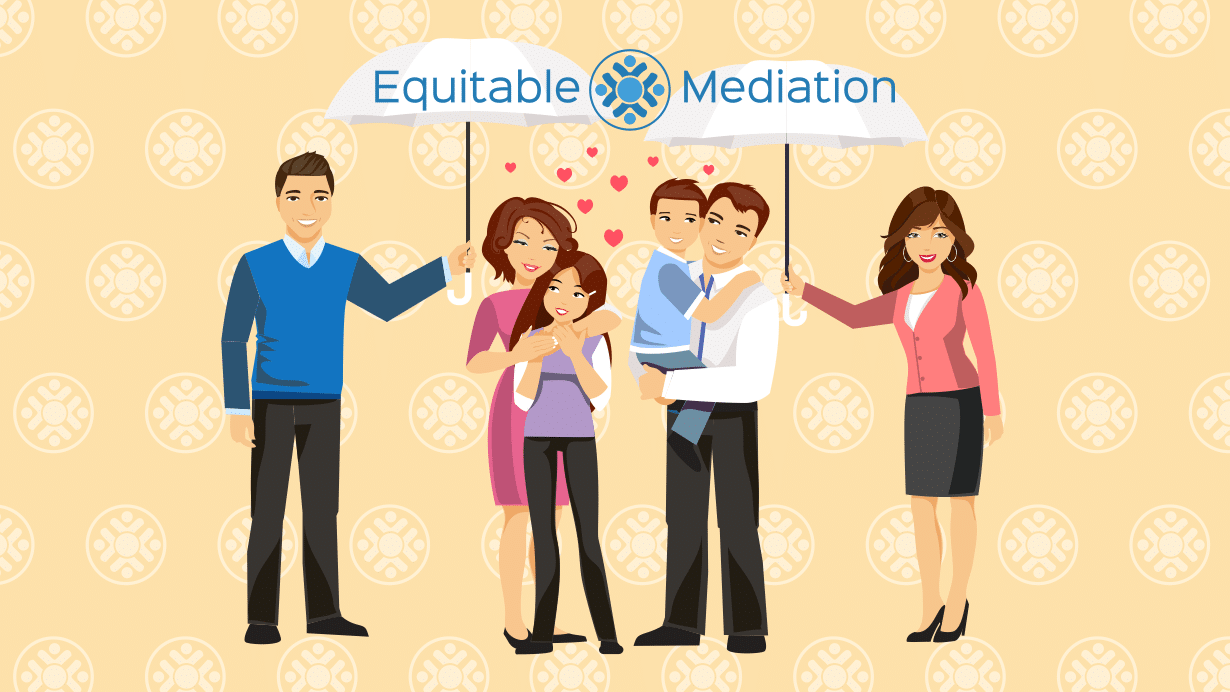
There’s no question divorce is hard on you. But it’s even harder on your kids. Imagine taking all the stress they undoubtedly feel about an uncertain future and the worries about where they’ll live, coupled with the feeling like this was somehow their fault. And put them in the middle of a family law attorney-driven divorce.
With each letter, phone call, demand, and argument sent back and forth between your divorce lawyers, the process becomes more and more adversarial. And soon you and your spouse may be so busy fighting you’ll have no time to focus on your children. Let alone agree on what’s best for them.
So off to court proceedings you’ll go…
Do you really want your child taking the stand in a family law court being forced to answer the question, “Do you want to live with your mother or your father?” That’s exactly what could happen in traditional litigation if you don’t mediate.
Divorce mediators treat you as parents. Not as litigants. Every decision in mediation is made with one thing in mind: How will this impact the children?
When you spend your time focusing on the kids instead of trying to exact revenge on your soon-to-be-ex through your divorce negotiations, marital issues get resolved much faster and potential arguments are often avoided.
Remember, after you’re divorced, you’ll no longer be husband and wife, but you will still (and always) be mom and dad.
So do what’s best for your children and mediate your divorce.
Another of the benefits of mediation in divorce is that it takes less time and is more efficient
It’s no surprise the family court systems are overwhelmed. State budget cuts. Hiring freezes. And an ever-increasing workload. Getting a court date could take up to a year.
Now try and get two divorce lawyers to also agree to meet on the date and time the courts gave you. Throw your busy schedules into the mix and you’ve got a scheduling nightmare on your hands. Before you know it, your divorce could take two to three years! Time you’ll spend waiting around. Unable to move on with your life.
Stuck living together. In limbo. Not knowing what your settlement is going to look like or when you’ll get your divorce decree.
Talk about stressful!
Mediation, on the other hand, is much more efficient.
And can take as little as two to three months.
Because you will be fully in control, by using divorce mediation, you can more quickly end your marriage, begin the healing process and move forward with your life. No trying to coordinate schedules with family law divorce attorneys or a judge. Or waiting around for the court process to dictate when you can come in.
You’ll move through the process as quickly or slowly as you wish. Taking as little or as much time as you need to resolve all of the issues necessary.
No divorce attorney required.
Courts love a mediated divorce. Because all issues are already resolved, couples can usually get their divorce finalized in a matter of weeks. And that’s it.
So ask yourself: Do you want your divorce to take two to three years or two to three months?
One of the mediation benefits is that it’s more cost-effective than hiring attorneys for divorce
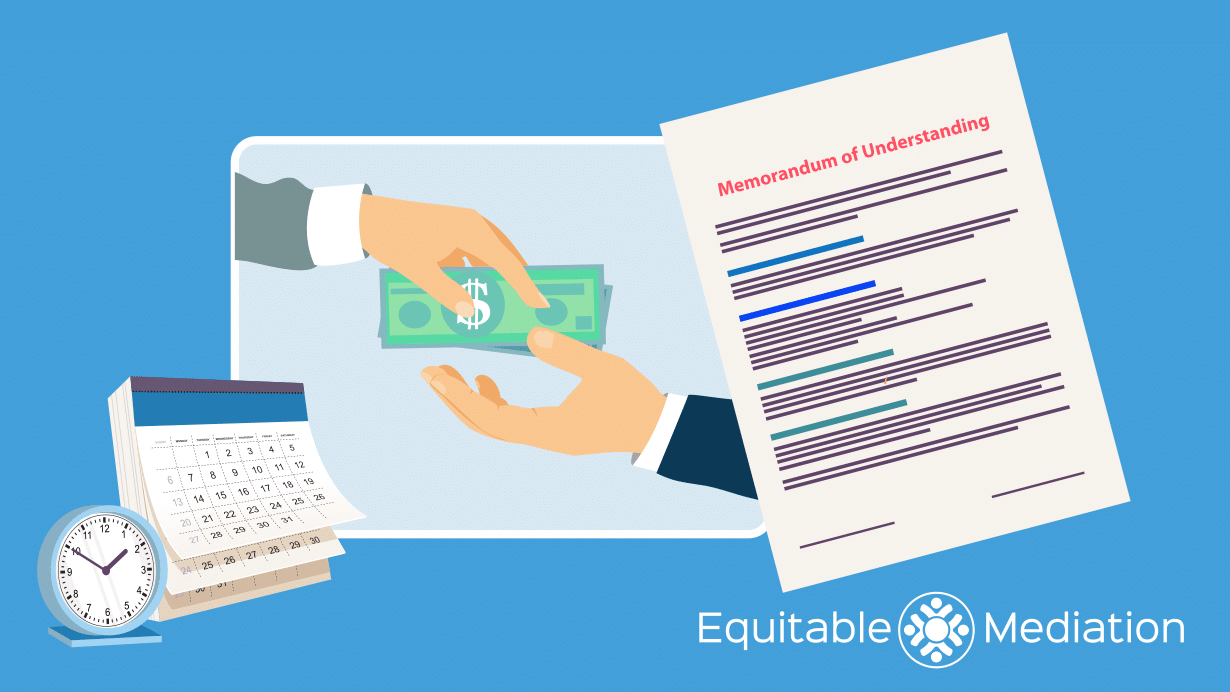
Fact: Mediation is less expensive than typical divorce proceedings using attorneys.
The Wall Street Journal reported that the average cost of a “friendly” attorney divorce is between $27,000 and $32,000. And that’s if all “goes well.” If it doesn’t (and let’s face it – not many attorney-driven divorces do), that cost range becomes $78,000 to $200,000.
Do you have that kind of money to spend on your divorce? Even if you did, do you want to?
To start, most divorce lawyers require an initial retainer of between $5,000 and $10,000 per person depending upon the complexity of your case and how well you and your spouse get along. So before you even negotiate your first point, you’re divorce cost will be $10,000 to $20,000. By the time things wrap up, you could be looking at tens or hundreds of thousands of dollars more to get your divorce.
One of the advantages of mediation is that both spouses will work with one mediator who is dedicated to helping them both reach a resolution as quickly and efficiently as possible.
The total average cost of mediation is thousands less than a lawyer-driven divorce.
And some mediators don’t require a retainer. You just pay as you go. Or, better yet, you might find a mediator who offers a flat fee so you can know up-front exactly what your mediation will cost from start to finish.
Why is mediation so cost-effective?
First, you’re working with one mediator instead of two divorce lawyers. So you’ve already cut the number of professionals involved in half. Second, there’s no back and forth between attorneys. All communication is done in real-time, between all parties, and out of court. Allowing you to resolve things faster thus keeping costs in check. Finally, because mediation is about problem-solving and agreement building instead of each attorney trying to prove a point and “win” something for their side, solutions are reached much more quickly.
Less time to case completion equals much lower costs for you.
By choosing to mediate your divorce, you’ll be able to put your own kids through college instead of your attorneys’ kids.
“Divorce lawyers stoke anger and fear in their clients, knowing that as long as the conflicts remain unresolved, the revenue stream will keep flowing.” – Craig Fergusen
Another benefit of mediation: It’s empowering and fair
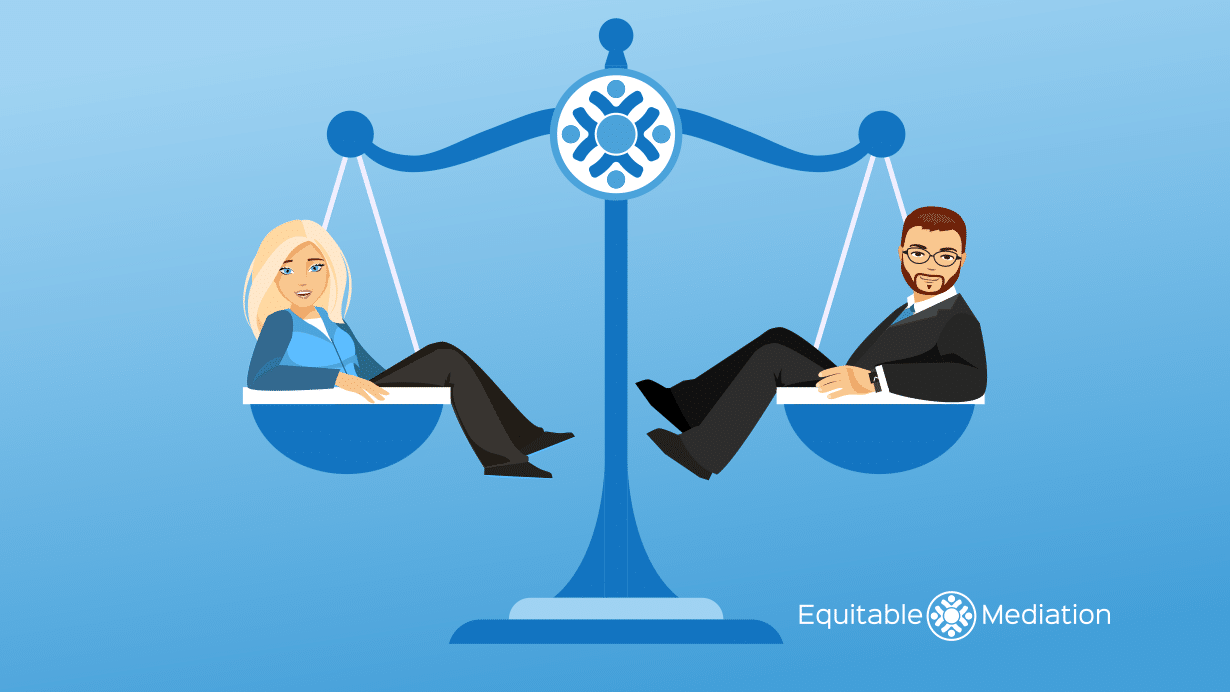
When you hire a divorce lawyer, you’re giving up control of your future to a complete stranger. Sending them off to make decisions that will impact you and your children for the rest of your lives. While you sit around waiting for an e-mail or phone call with the results of the negotiations.
“It’s the best you can expect to get,” you’ll be told. “I wouldn’t argue for more if I were you,” your attorney will say. So you sign the papers even though you don’t think it’s a fair deal, but you don’t want it to get any worse.
In family mediation, you are in complete control of your future.
And you don’t need to involve lawyers if you don’t want to.
You’re both empowered to engage in an active agreement-making process. And make choices that are in your mutual best interests and the best interests of your children. Allowing you both to achieve your intended goals. And feel good about the agreements you made.
With no regrets.
As opposed to the traditional attorney-driven “win-lose” model that is based on positions such as, “You tell my no-good husband/wife I have to get at least $X a month in alimony or they’ll never see the kids again!” One of you might get what you want by sheer brute force. While the other will be resentful that they gave in. That’s not empowering or fair in the slightest.
Take charge of your future and mediate your uncontested divorce instead.
One of the benefits of divorce mediation is that a successful mediation has a higher rate of compliance
Do you prefer to be told what to do? Or would you prefer to have a say in what happens? If you’re like most people, you’d rather have a say. I mean really. Who likes being told what to do?
In the first option, you and your spouse use attorneys who, by default, are overbearing in nature. They claim to know what’s best for you and what you deserve. And they’re going to fight to try to get it for you. No matter what the cost.
But what if your attorney fighting for something you don’t care about or want in the first place? Or you and your spouse can’t agree on anything so you have no choice but to go to divorce court and take your chances. Only to end up with an agreement neither of you is happy with.
In mediation, you’ll both have a say in what’s important. In what’s going to be discussed. And in which order it’s going to be resolved. Doing so allows you to come to an agreement that reflects your unique wants and needs and the needs of your children. Covering the issues that are important to both of you.
Making it much more likely you’ll both be satisfied with the terms of your agreement and adhere to it now, and in the future.
To give you some food for thought:
With respect to compliance with the agreement and re-litigation, 80% of divorcing spouses [who mediated] reported compliance, with only 60% of the adversarial parties.
Source: Divorce Mediation: Reflections on a Decade of Research by J. Pearson and N. Thoennes
It’s hard to not comply with something you had a hand in creating, don’t you think?
Another of the advantages of mediation is that mediation results in more thorough and practical agreements
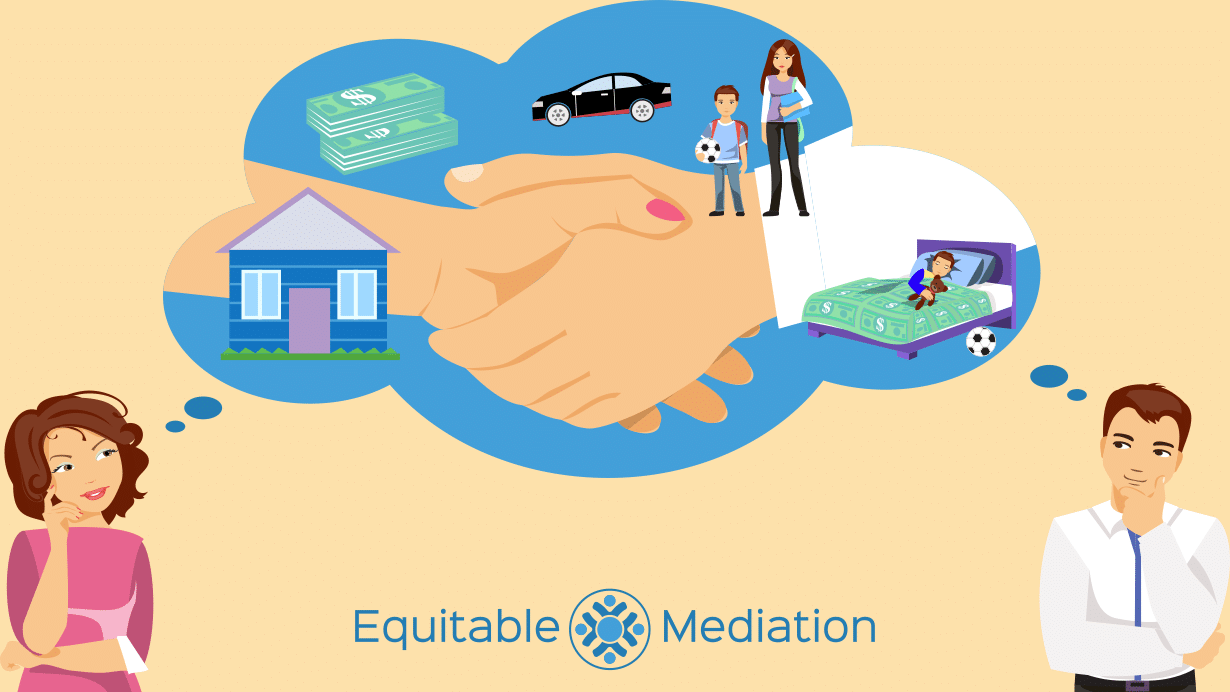
As you’ve just learned, having a say in what your settlement agreement looks like can go a long way towards both fairness and compliance. But mediation can also go a long way toward getting you an agreement you can actually use.
Unlike in a traditional process where it’s all about interpreting, arguing, and crafting agreements based strictly on law or money, mediation allows you to create an agreement that is based on your situation and your family’s unique needs.
In mediation, you will discuss, agree on and have the mediator draft a document that covers all necessary divorce issues such as child support and how you will divide a 401K plan. But you’ll also be able to discuss and resolve other important life matters such as how your children can be introduced to your ex’s new significant other, how your family pet will be cared for, etc. And language can be included in your agreement to cover all of these things. Because while who gets the house or how much alimony you’ll have to pay or will receive are important topics to discuss and agree on, there’s much more to a divorce than just that.
In addition to the required topics that need resolving, divorce also needs to address all of life’s other challenges and responsibilities. Unlike the traditional process, mediation can help you discuss, decide on and plan for every type of situation – now and in the future.
Why is mediation advantageous? It’s a more personalized and dignified experience
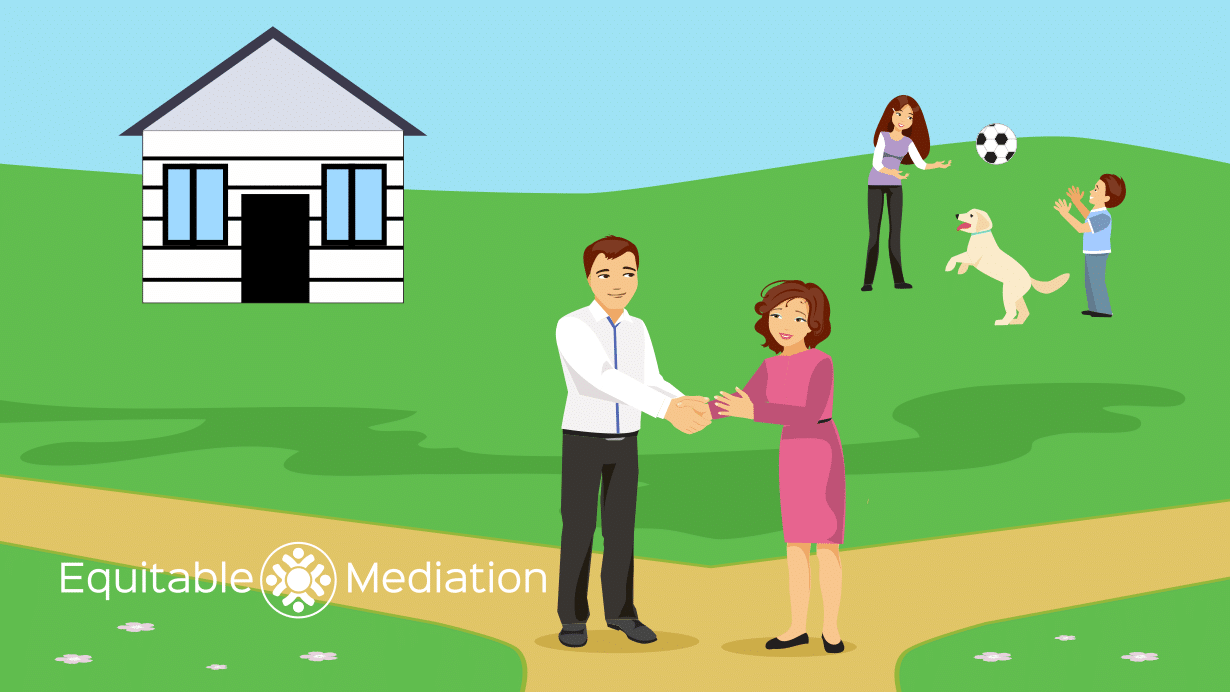
Ever set foot in a courthouse? Big marble columns. Cold tile floors. Courtrooms that echo with the sound of your voice. It’s highly impersonal. And the people in there? They run around like they’re in some sort of race. Hustling from room to room and case-to-case, shouting as they go.
Try as they might, courthouse staff and judges are so overburdened with caseloads they simply can’t get to know each divorce litigant and defendant personally. They need to get you in, out, and on your way, because they’ve got 15 more just like you on the docket over the next 8 hours.
“Next!”
You’ll get to know your mediator and he’ll get to know you. He’ll take the time to learn about your lives. Your children’s lives. And your goals for the future. Doing so allows your mediator to understand what matters most to each of you and your family. And to suggest options that may be applicable in your unique situation. All over the course of as much time as you need to come to agreement on all relevant issues.
Mediation truly is a kinder, more dignified, human process.
Another reason to mediate your divorce: Mediation is more convenient and flexible
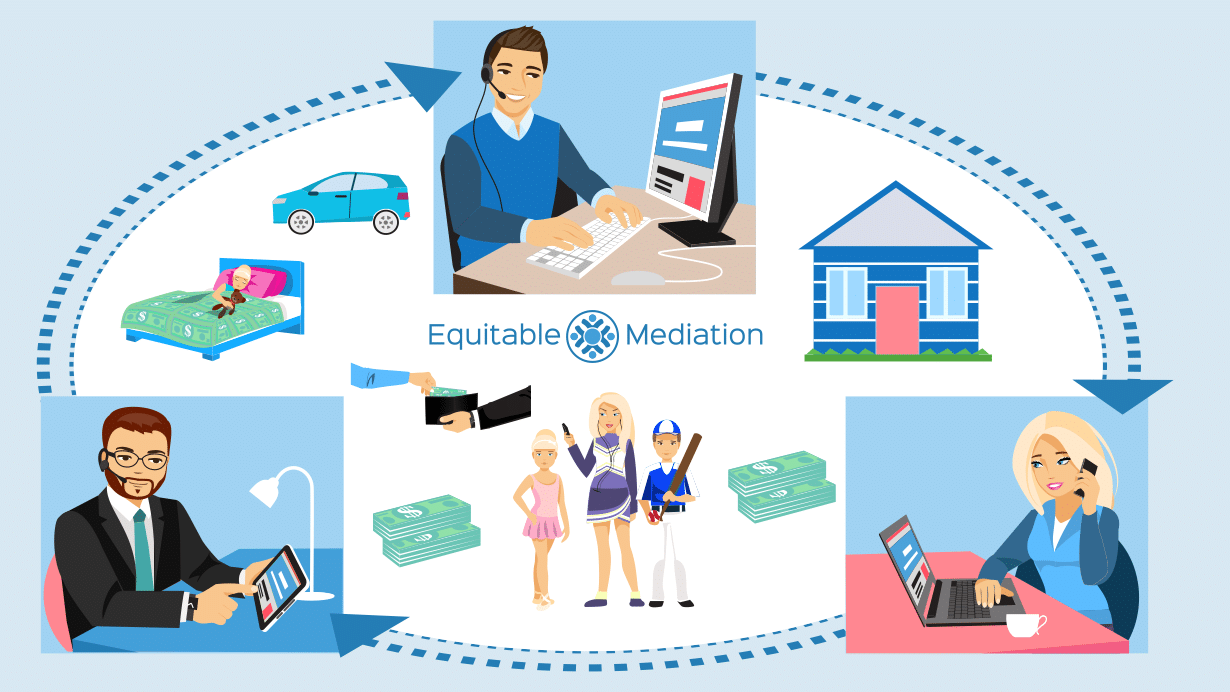
When you work within the confines of the traditional divorce process, you’re forced to show up when and where you’re told. There’s no messing around. And if you don’t, you’ll have an awful lot of problems.
On the other hand, mediation allows you, your spouse, and the mediator to select a day and time that works for all of you. In addition to the scheduling flexibility, some mediators also offer online divorce mediation services for location flexibility.
You may travel frequently for your job and wonder how you’re ever going to be able to fit a mediation session in since you’re always on the road. Or perhaps you and your husband or wife live or work far apart geographically and the logistics of being in the same place at the same time are all but impossible. Or, you may simply not be comfortable sitting next to your soon-to-be ex in the same room.
Online mediation can happen anywhere.
And finally, one of the biggest benefits of divorce mediation is that it’s a private and confidential process
Most people forget that divorce litigation in court is a public forum. Anyone and I mean anyone, can sit in the back of a courtroom and watch the proceedings unfold in your divorce case.
Your friends. Your family. That neighbor who knows everybody’s business. (You know exactly which neighbor I’m talking about.) The breakup of your marriage is on full display. And your dirty laundry hung out for all to see. And before long, you’ll have a full-blown circus on your hands.
Divorce through the traditional process is very public and very humiliating.
Mediation, on the other hand, is completely private.
No one knows what’s being discussed except you, your spouse, and the mediator. Everything is decided in the confines of the mediator’s office or via private communications. All e-mail communications, meeting notes, case files, and agreements remain secure and only shared with those you’ve given the mediator explicit permission to share with. Mediation is also protected in the United States by the Uniform Mediation Act. Making all conversations privileged and confidential except under extraordinary circumstances.
You can feel comfortable and free to discuss almost anything during a divorce mediation session.
You’re going to be sharing the most intimate details of your life with your chosen professional. So unless you enjoy putting on a show for the entire world to see, be like Bill and Melinda Gates or Jeff and MacKenzie Bezos, and choose the private and confidential process of mediation.
How to know if mediation is a viable option for your divorce
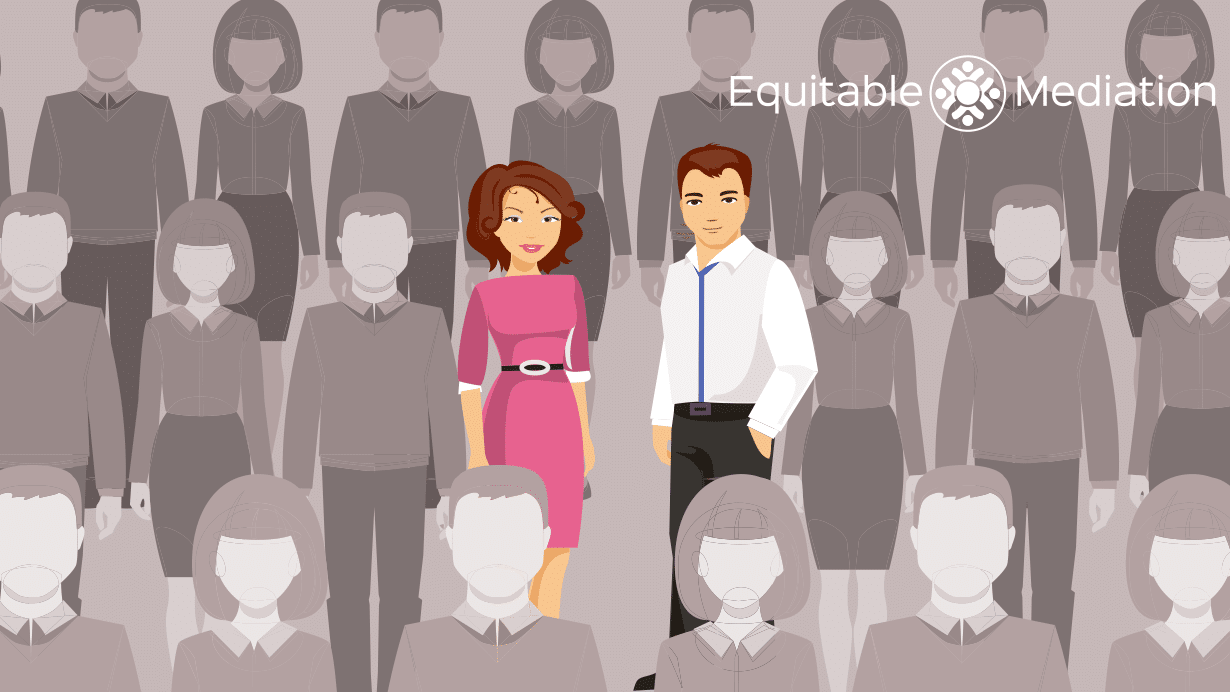
It takes two people to get married but only one to get a divorce. So no matter which path forward you take, you will eventually wind up divorced It simply becomes a choice as to what divorce method you use to get there.
Knowing you have a choice, you’ll want to select the divorce method that allows you to have the most peaceful, fair, child-focused, and cost-effective divorce possible. And that choice is mediation. No other divorce option comes close to offering the advantages that mediation provides. Almost anyone can mediate.
All it takes are these things:
- You are both willing to voluntarily attend and actively participate in mediation.If only one party wants to mediate but the other party does not, then, unfortunately, mediation will not be a viable option for divorce.
- You are both comfortable and interested in making your own decisions.Because mediation follows the principles of self-determination, couples acknowledge that they will be in complete control of the choices made regarding their divorce settlement. The mediator is a neutral third party who will help identify each relevant divorce issue and bring options to the table but will not give legal advice. Or tell either of you what to do.
- You are both mentally capable of making your own decisions.Your mediator will provide you with information you need in order to make the decisions required. But you must be of sound mind and have the mental capacity to make them. If either party is mentally incapacitated, mediation will not be a viable option.
- You are both willing to be transparent and engage in a good-faith negotiation.Because mediation is a transparent process, you will both need to be prepared to engage in good-faith negotiation. That means you’ll need to reveal and openly disclose all relevant information, whether financial or otherwise, to the mediator and to your spouse. And ensure that the information is accurate, complete, and truthful to the best of your knowledge. If either party is hiding assets, defrauding the other, or not being honest, you will not be able to mediate.
High conflict or low conflict, whether only one of you controlled the finances or you both balanced the checkbook, kids or no kids, as long as you and your husband or wife meet the guidelines listed above, you are good candidates to use divorce mediation.
What are the benefits of divorce mediation – conclusion and next steps:
So there you have it! You now know:
- How mediation is the most peaceful and child-focused of all divorce options.
- How mediation can help you get through your divorce in less time, with less stress, and at a lower cost than a lawyer-driven divorce.
- How mediation is the most flexible of the divorce methods, allowing you to control the pace and divorce terms of your settlement.
- How mediation empowers you to create a fair and thorough agreement that meets your unique needs and the unique needs of your children.
Hopefully, you learned enough about the advantages of mediation to understand why it’s the best option for divorce.
So what now? Where do you go from here?
It all really depends on where you are in the process.
- For example, if your wife or husband is already aware of your decision to divorce and he/she is willing to proceed, your next step might be to suggest mediation in hopes they’ll agree to mediate.
- On the other hand, if you both already agree on using mediation, your next step is to hire an expert mediator to guide you through your divorce negotiations.
Luckily, you found us!




